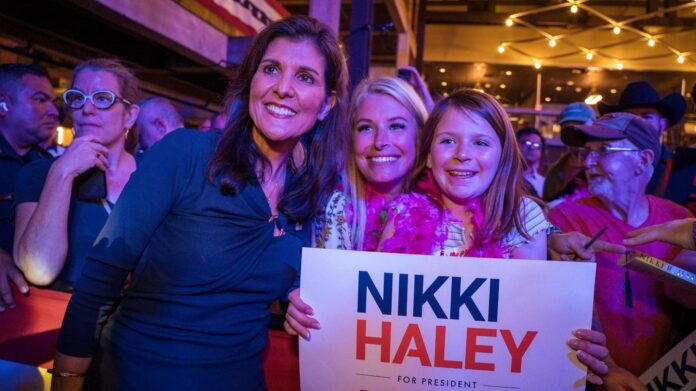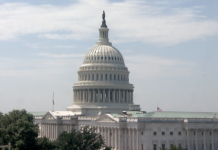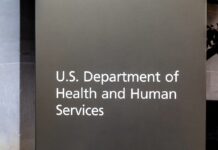
CHARLESTON, S.C. (States Newsroom)—Former South Carolina Gov. Nikki Haley withdrew from the Republican presidential contest Wednesday, ending her increasingly long-shot bid to topple former President Donald Trump.
Haley ended it with a speech in Charleston, where she launched her campaign.
She congratulated Trump but did not endorse him, saying that the former president is now obligated to earn the support of those who did not vote for him in the primary.
While she fell far short of being the GOP nominee, the South Carolina-born daughter of Indian immigrants made history as the first woman to win a GOP presidential primary.
She kept her pledge to stay in until Super Tuesday when voters in 15 states went to the polls to choose between the two. She won only the smallest state — Vermont — bringing her tally to two.
When it became apparent that the day had added little to her count, U.S. Sen. Tim Scott of South Carolina—who left the race in November—again called on Haley to step aside and endorse Trump.
“Thank you for running. You’ve been courageous and strong and tenacious,” Scott, who was first appointed to the Senate by Haley, said Tuesday night on Fox News. She added that it’s time for her to get behind Trump and concentrate on ousting President Joe Biden.
“This is no longer about any other candidate than Donald Trump,” Scott continued. “Voters have spoken. They’ve spoken clearly.”
Haley made no public appearance Tuesday as she watched the results from home, signaling an end was near.
For weeks, she’s been pointing to her voters as proof he will have problems in November, which her campaign continued to do late Tuesday in a statement that took another swipe at her former boss.
“Unity is not achieved by simply claiming ‘we’re united,’” Haley spokesperson Olivia Perez-Cubas said in an email. “Today, in state after state, there remains a large block of Republican primary voters who are expressing deep concerns about Donald Trump. That is not the unity our party needs for success. Addressing those voters’ concerns will make the Republican Party and America better.”
But as perhaps a sign Trump knew she was done, he never mentioned Haley’s name in his Super Tuesday victory speech.
Haley managed to outlast 12 other Republican “fellas,” as she liked to say, after becoming the lone candidate standing in Trump’s way of the nomination.

However, despite getting the one-on-one she wanted early in the voting calendar, her path to a win looked increasingly improbable, even as she insisted otherwise.
The Trump-versus-Haley race grew fiery once Florida Gov. Ron DeSantis bowed out ahead of the New Hampshire primary. After she lost by 11 percentage points in the Granite State — which turned out to be her closest losing margin — the calls for her to withdraw intensified.
She refused, spinning defeats as wins.
She noted rising from just 2% in the polls to 43% of New Hampshire GOP primary voters choosing her. She told South Carolina voters that Trump should feel threatened by her rise. The claim clearly irked him.
Trump responded by threatening to permanently bar from “MAGA camp” anyone who continued to donate to her campaign. Haley was undeterred, pitching herself as the choice of reason and normalcy instead of two old men with questionable mental fitness. The 52-year-old former governor called on both 81-year-old Biden and 77-year-old Trump to take competency tests.
She said chaos follows Trump. His first United Nations ambassador accused him of being unhinged and dangerous on the world stage. He called her birdbrain. She called him a chicken for not debating her.
And her donations kept coming — for a while.
Her campaign raised over $11.5 million in January alone, according to her disclosures.
The cash allowed her to back up her pledge to keep giving voters a choice through Super Tuesday when 854 delegates were up for grabs. Ahead of Tuesday’s voting, Haley had 43 delegates to Trump’s 273.
“Dropping out would be the easy route. I’ve never taken the easy route,” Haley said in Greenville ahead of the Feb. 24 contest in South Carolina. “I’ve always been David taking on Goliath.”
She leaned into her perpetual underdog status, recalling her first win to the South Carolina House in 2004, when she defeated the chamber’s then-longest-serving legislator for a seat in Lexington County. And she recounted her come-from-behind win in 2010, when she defeated a congressman, the attorney general and lieutenant governor to become South Carolina’s first female and first minority governor.
But even in her home state, her popularity among Republicans waned as she stepped up attacks against the GOP frontrunner, according to Winthrop Poll results in February versus November.
Trump attracted thousands to rallies in South Carolina. Haley attracted hundreds — sometimes just dozens — as she traveled the state by bus.
She ultimately lost her home state by 20 percentage points. And that dried up some of her key financial support.
Americans for Prosperity Action, an organization founded by prominent conservative billionaire brothers Charles and David Koch, had never endorsed a presidential candidate prior to Haley. Following her South Carolina loss, the group announced it would no longer spend money to promote her.
Her losing margins grew wider, though she picked up her first win in Washington, D.C., last weekend, which accounted for 19 of her delegates.
And she continued to campaign hard, holding 15 rallies across nine states following the South Carolina primary.
She picked up endorsements from GOP Sens. Lisa Murkowski of Alaska and Susan Collins of Maine, two of the 15 Super Tuesday states, and released new ads. They didn’t help.
On Tuesday, she won only the smallest of the states, Vermont, and it’s not yet unclear how many of its 17 delegates will go to her tally. Under Vermont rules, she needs to cross 50% to take all 17. As of Wednesday morning, she was at 49.9%, according to The Associated Press.
Around midnight, her campaign continued to spin the positive.
“We’re honored to have received the support of millions of Americans across the country today, including in Vermont where Nikki became the first Republican woman to win two presidential primary contests,” Perez-Cubas said in a statement, referring to Vermont and Washington, D.C.
What the future holds for Haley is unclear after her insistence to stay in and step up attacks riled the MAGA faithful. Trump has made clear she’s not on his list as a running mate.
On Sunday, Haley walked back a promise to endorse Trump if he wins the nomination.







